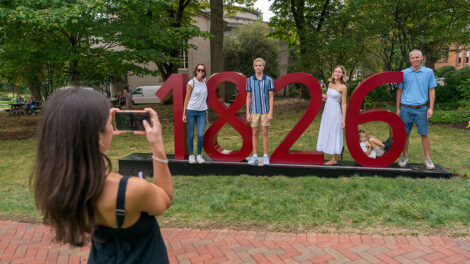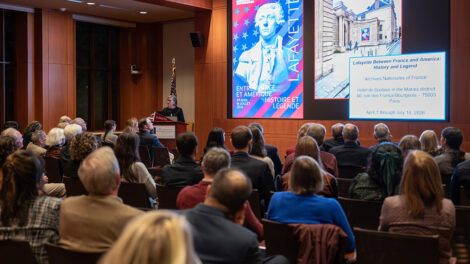One mentor, two students, and the Nobel Prize
From its earliest days, Lafayette College has inspired lifelong relationships and friendships between faculty and students/alumni, collaborations that have often resulted in inspired research and advancements in science and the humanities.
During the Bicentennial, we celebrate Lafayette mentorships and their teacher-scholar legacy that continues to nourish an endless passion for learning and exploration.
By Bryan Hay
Professor of biology Beverly Waugh Kunkel was known for motivating students during his time teaching at Lafayette from 1915-1952. He would treat them like colleagues, setting the stage for mentor relationships that would last far beyond graduation.
More than once, the lessons imparted by Kunkel built a foundation for alumni to receive one of science’s highest honors: the Nobel Prize.
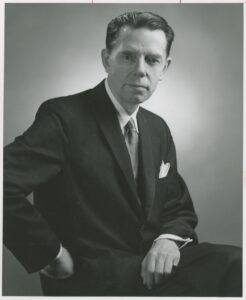
Philip S. Hench, Class of 1916, was a Mayo Clinic physician when he received the Nobel Prize in 1950 for his work on cortisone.
Nobel Prize winners Philip S. Hench, Class of 1916, and H. Keffer Hartline, Class of 1923, were both students of Kunkel’s. Throughout their distinguished professional lives, Hench and Hartline credited their professor for planting the seeds of learning and discovery at Lafayette and his genuine interest in advancing their careers, long after they left College Hill.
Hench (1896-1965), a physician working at the Mayo Clinic, won a Nobel Prize in 1950 for his work on cortisone. After nearly 20 years of observations, Hench, the Mayo Clinic’s first rheumatologist, showed that cortisone could reverse inflammation associated with rheumatoid arthritis. He and his colleagues began testing cortisone on patients and found that it suppresses the immune system, reducing inflammation, pain, and swelling.
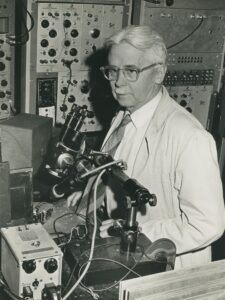
H. Keffer Hartline, Class of 1923, a neurophysiologist and Rockefeller University professor, was a co-winner in of the Nobel Prize in 1967 for his discovery of the optical nerve network.
Hartline (1903-1983) led the way toward understanding how the human brain processes visual information, studying the electrical characteristics of vision and how optic nerve fibers interact with each other to enhance contrast. The neurophysiologist and Rockefeller University professor was a co-winner of a Nobel Prize in 1967 for his discovery of the optical nerve network.
Kunkel (1881–1969) mentored countless students during his life, and after his retirement in 1952, visited Lafayette almost every day, his white hair, white mustache, and circular cloak hard to miss. He would walk a mile from his home and continued his lifelong interest in scientific subjects.
When he was honored by alumni in 1968 at the Waldorf-Astoria Hotel in New York, Kunkel demurred, telling the crowd that his track record mentoring students who went on to great achievements was “just an accident.”
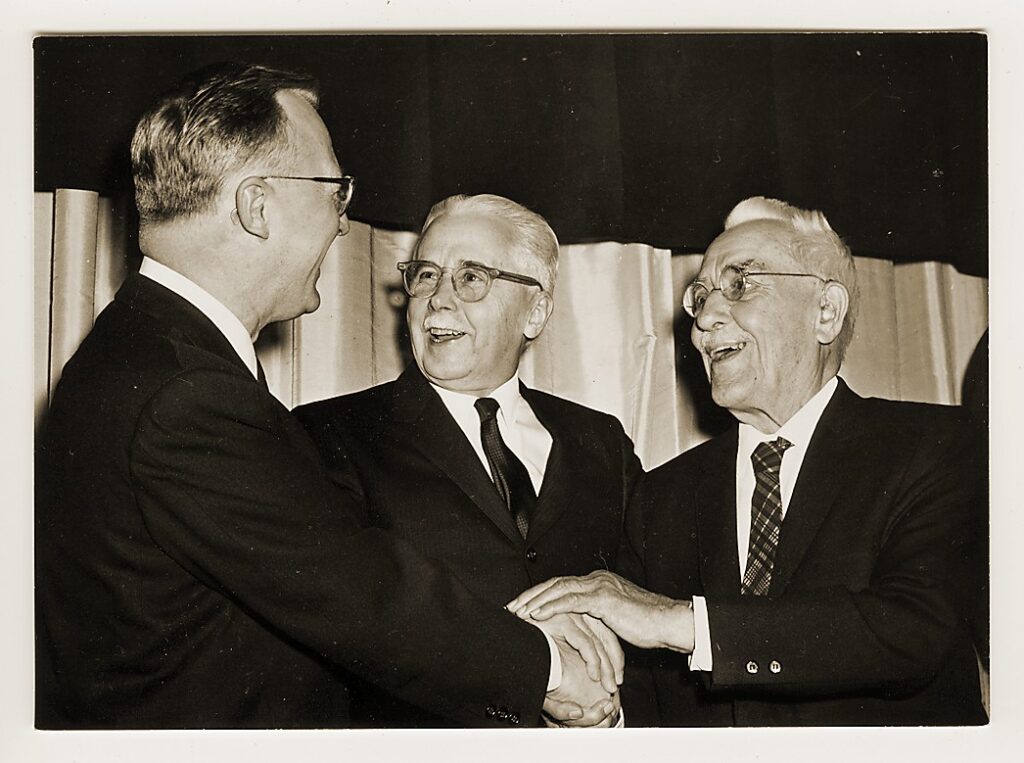
(L-R) K. Roald Bergethon (1918-2004), 12th president of Lafayette College, greets Keffer Hartline ’23, and Prof. Beverly Kunkel.
When Kunkel was honored by the Easton chapter of the General Alumni Association in 1950, Hench, having just received the Nobel Prize, presented his former professor to the audience.
“Dr. Kunkel was one of the finest teachers I ever had. He stimulated my interest in this field of biology, and I remember with real satisfaction my course under him,” Hench said. “For example, one of the thrills of my early career was Dr. Kunkel’s demonstration of rotifers in one of the first classes.
“Some teachers have the ability to inspire,” he continued. “Dr. Kunkel had that effect on me. My sentiments have not changed. I wrote those words. I meant them most sincerely then; I repeat them now.”
Faculty-student interactions such as the ones shared between Kunkel, Hench, and Hartline are still the foundation for research and teaching in the Biology Department today, says Mike Butler, professor of biology and department head.
“Whether in the lab, in the field, or using computational approaches, our students develop into scientists in their own right,” he says. “When we hear from alumni who graduated years or decades ago, and they comment on these experiences, we are delighted, knowing we had an impact on their lives.”
Lasting Legacy
- In 1968, the College held a celebration in honor of H. Keffer Hartline, Class of 1923, who received the Nobel Prize in medicine in 1967, Philip S. Hench, Class of 1916, who received the prize in 1950, and their faculty mentor, Beverly Waugh Kunkel, professor of biology at Lafayette from 1915-1952. At the time, Lafayette was one of only 13 institutions of higher learning with two or more Nobel Prize winners among its alumni. Lafayette was the only one of the 13 devoted to an undergraduate education.
